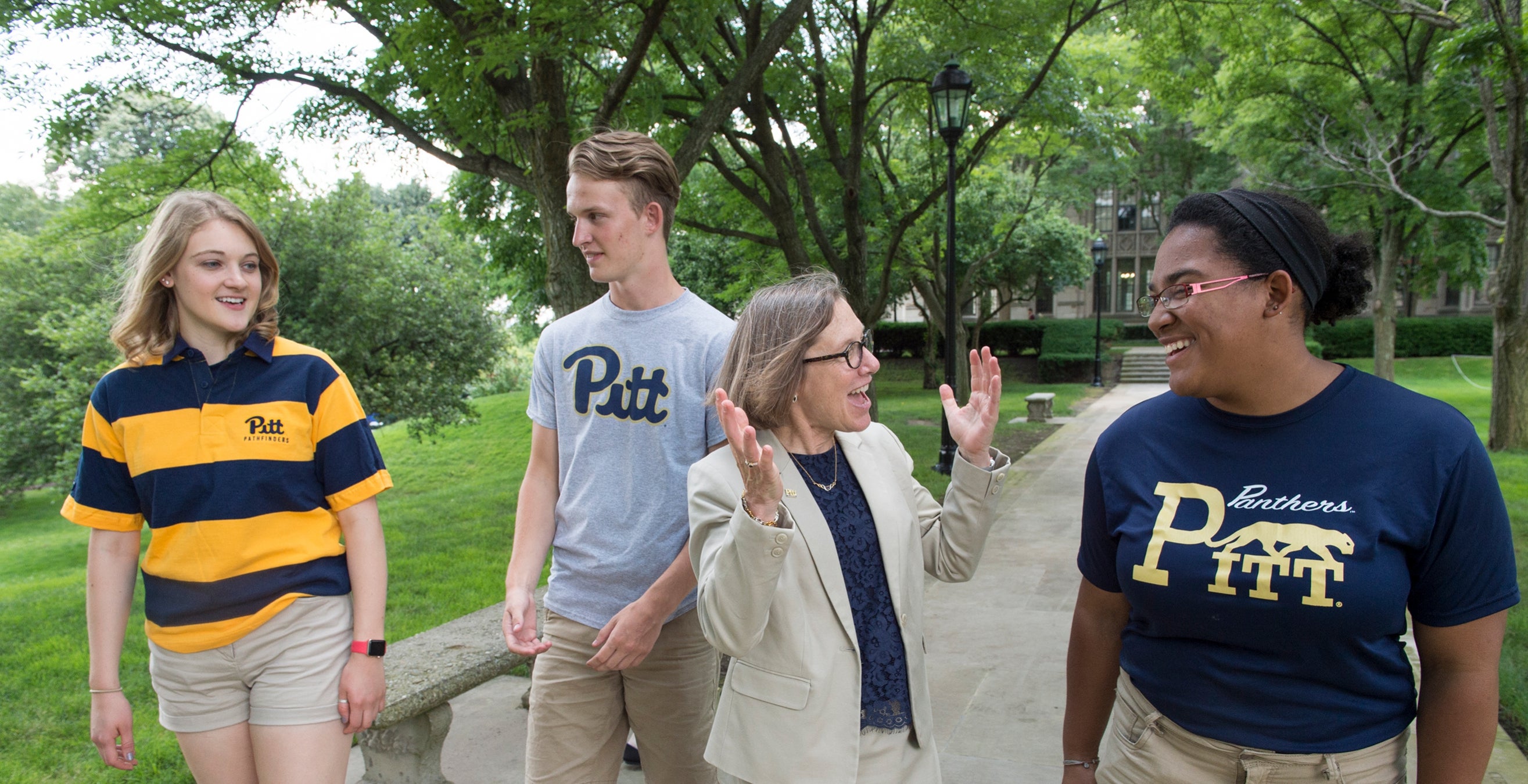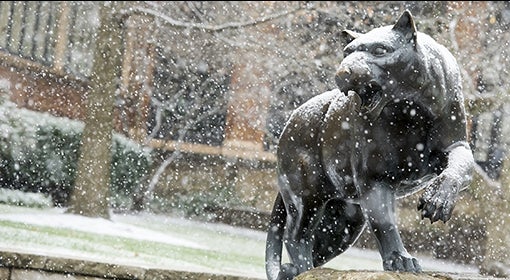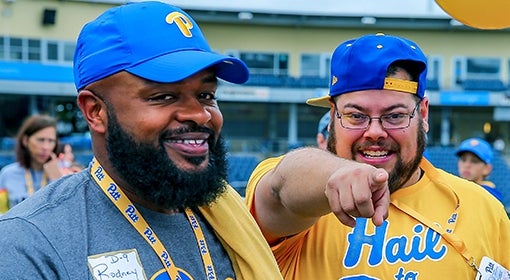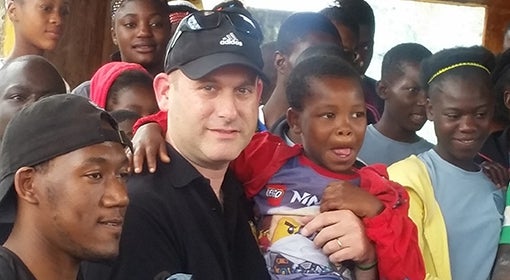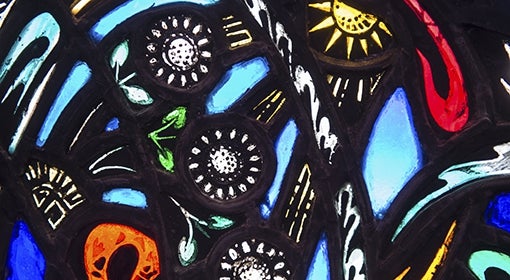Runner #3189 is wearing a shirt emblazoned with the new script Pitt and colors. She dashes along the rain-slickened asphalt with a throng of 5,000 others in the 2019 Pittsburgh Marathon. Suddenly, at about the halfway mark, she feels a jolt of pain in her right knee. Wincing, she glances at the line of runners ahead, contemplating the many miles still to go. Ann E. Cudd has always been focused and determined, but on this day, as she continues on, will that inner strength be enough to get her to the finish line of her 14th marathon?
It has already helped propel her over hundreds of miles throughout her life.
She “was always running,” recalls Cudd’s mother, Bernice Daniels. Perhaps she was inspired by the students from a nearby college who often jogged past the family’s horse farm in the village of Gambier, Ohio. Cudd became part of the Midwestern landscape, too, “constantly running up and down the roads,” her mom says, even occasionally jogging eight miles to high school.
Cudd—who became provost and senior vice chancellor at the University of Pittsburgh in fall 2018—believes that her lifelong passion for running has taught her a lesson that transcends winning races: No goal can be reached without either the commitment to go the distance or the strength to overcome the adversity that invariably pops up.
She calls on that wisdom at Pitt as she pushes forward with bold new programs meant to strengthen the University’s commitment to inclusive excellence, battle onerous college debt, and pioneer innovative pathways for student accomplishments. Her agenda presents formidable challenges, with aspects that even presidential candidates are struggling to tackle. But Pitt’s provost isn’t one to be intimidated.
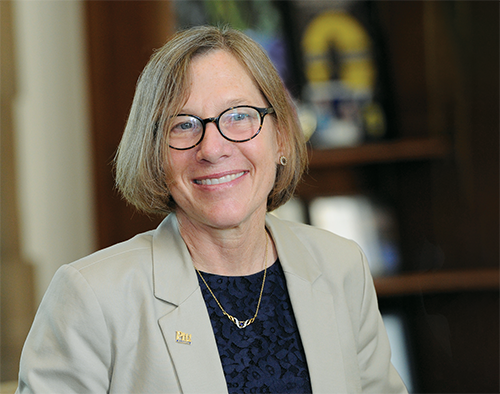 Cudd was already charging toward challenges as a student in junior high school in 1972. That was the year of the passage of Title IX, a national education measure prohibiting gender-based exclusion from programs or activities, including sports. Even then, she knew the law was a good thing. She played basketball, swam, and won ribbons in horseback riding. But she really liked distance running, even though her school had no cross-country team for girls. So, when the track coach began to recruit for the boys’ high school team, she reminded him about Title IX; he had to allow girls on the team, too.
Cudd was already charging toward challenges as a student in junior high school in 1972. That was the year of the passage of Title IX, a national education measure prohibiting gender-based exclusion from programs or activities, including sports. Even then, she knew the law was a good thing. She played basketball, swam, and won ribbons in horseback riding. But she really liked distance running, even though her school had no cross-country team for girls. So, when the track coach began to recruit for the boys’ high school team, she reminded him about Title IX; he had to allow girls on the team, too.
“Whatever,” she remembers him saying. “If you want to come out and run six miles, you’re welcome to.”
She knew she wasn’t the only young woman who would benefit from the sport’s physical challenges and sense of inclusion. So, in an era when many girls were provided few extracurricular options beyond Future Homemakers of America, Cudd enlisted four of her friends and they sprinted across the gender barrier, becoming the first girls to run cross-country at Mt. Vernon Senior High School. The experience was empowering.
Being able to grasp the big picture—and its effects on individual lives—comes naturally for Cudd. It’s also a mindset that happens to be ideal for a University provost who, along with the chancellor, sets the University’s overall academic priorities for the student body.
Her most recent big-picture initiative is Pitt Success, which kicked off this past fall. It stems from the understanding that although a college education is required to open the door to many professions, financial need can limit who is able to get to the threshold. Cudd envisioned Pitt Success to be another means for the University to level the playing field, giving qualified prospective students a viable opportunity to attend Pitt regardless of family income.
“I always ask myself, ‘Am I playing a role in a system that is making the world measurably worse?’” she says. “If only the wealthy have the key to future success, then you just have this widening inequality. That just seemed to be something that I could change.”
Pitt Success offers a need-based financial aid plan that matches students’ federal Pell Grant awards and provides special grants for unmet needs. It also sets up specialized advising and mentorship for students in order to fully nurture their talents and help ensure achievement.
Pitt Success isn’t beneficial only to underrepresented and low-income students, Cudd points out. It’s good for society, too. She believes that increasing the diversity of Pitt graduates will expand the parameters of tomorrow’s innovators and thought leaders—ultimately enlarging the country’s talent pool to be globally competitive and solve many of the world’s problems.
A career in academia wasn’t always Cudd’s ambition. The daughter of a librarian and a horse farmer, she was a voracious reader who often sat at the table with her family absorbing the news of the day: civil rights, Vietnam, and Watergate.
Her curiosity and drive led her to fast-track through high school. She graduated a year early. With the extra time before college, the artistically inclined teenager thought she would head straight to the nearby vocational institute to learn welding, a skill she hoped to use in making sculptures.
Her guidance counselor, perhaps fearing that Cudd would get sidetracked from her plan to seek a life of the mind, suggested a different path that would help her achieve that goal: college prep school.
So, she set her sights on Phillips Exeter Academy in New Hampshire. It’s one of the country’s oldest and most renowned secondary schools, with alumni ranging from Abraham Lincoln’s son Robert to Facebook’s Mark Zuckerberg.
None of the family was surprised when she applied, says her mom: “She was driven. If this would help her go to a good college, she was game.”
The prep school both accepted her and granted her a scholarship. When she arrived there in 1976, she recalls, it was a different world from where she kept the stables and fed the horses. Her classmates and friends represented a mix of ethnic and class diversity—some students came from upper-class privilege, but others were from struggling urban schools or rural areas. For the most part, she says, all were bright and driven to succeed in their respective interests.
Cudd’s steadfastness there earned her a scholarship to Swarthmore College, one of the nation’s top liberal arts schools. So, in 1978, she packed her things into the family’s pickup truck and drove across Pennsylvania to Swarthmore’s suburban Philadelphia campus. There, she delved into a broad array of studies—engineering, sociology, physics—before choosing to major in math and philosophy. The disciplines allowed her to explore her growing interests in solving puzzles and understanding the nature of knowledge itself.
Along the way to her degree, she found time to run track and cross-country, often finishing in the top 10 and eventually becoming the second-best miler on the team.
She graduated with distinction in 1982. As she contemplated her future, she also looked back.
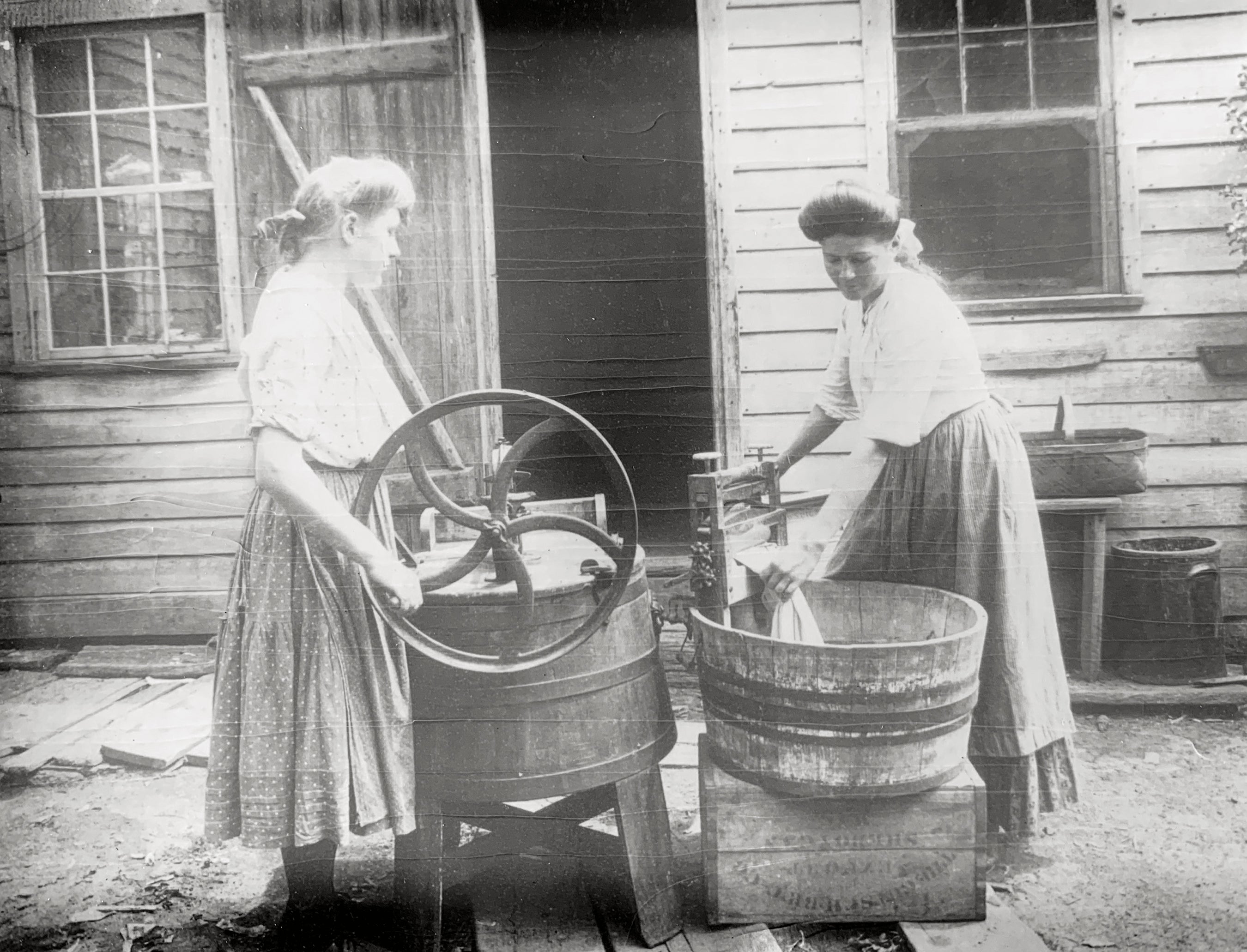 There’s a favorite picture she keeps nearby even today—a century-old sepia photograph of her grandmother Ida and great-aunt Hannah. The two young sisters are at work on a Wisconsin farm. Wearing long skirts and stockings with their hair swept up, they stand in dirt in front of their home, washing clothes with a wooden tub and wringer. It’s surely a methodical, painstaking chore. As she grew, the image always inspired Cudd to reflect on the years of cultural change that have given women the chance to move beyond the confines of such labor.
There’s a favorite picture she keeps nearby even today—a century-old sepia photograph of her grandmother Ida and great-aunt Hannah. The two young sisters are at work on a Wisconsin farm. Wearing long skirts and stockings with their hair swept up, they stand in dirt in front of their home, washing clothes with a wooden tub and wringer. It’s surely a methodical, painstaking chore. As she grew, the image always inspired Cudd to reflect on the years of cultural change that have given women the chance to move beyond the confines of such labor.
Ida’s daughter became a librarian. What would Ida’s granddaughter become?
Gazing at the photograph also served to remind Cudd that more change is needed. She wanted to understand the roots of capitalism, feminism, inequality, and oppression in order to help build a fairer race to the finish.
Those aspirations led her to pursue a graduate degree in philosophy. In keeping with her upward trajectory, she landed at the University of Pittsburgh, home to what is today one of the world’s top-ranked philosophy programs.
Cudd was impressed by the department’s belief that it wasn’t just teaching, but also grooming the next generation of thinkers who would help shape the future of the field of philosophy and possibly the direction of society. The idea that professors could cultivate ideas and mentor individuals to have such reach made the profession, in Cudd’s view, one of the noblest to aim for.
In the Cathedral of Learning, she took classes with Wilfrid Sellars, who did groundbreaking work in empiricism and philosophy of the mind. In Sellars’s class, she moved toward an interest in the philosophy of economics, fascinated by questions in social science and human behavior and the conditions it explored. This led her to pursue an additional master’s degree in economics, through which she took classes with Alvin Roth, who eventually won a Nobel Prize in economics. He also served on Cudd’s dissertation committee.
She sat in conversations with Tamara Horowitz, another influential professor and one of the first women to teach feminist philosophy in the department. She led Cudd in an independent study and guided the inquisitive student to grapple with fundamental questions of how oppression against women and others could be rooted in social institutions. She also pushed Cudd to think about how belonging to different social groups and having different experiences could shape what is considered moral thinking.
The ideas that Horowitz presented stayed with the scholar. So much so that they planted the seeds for Cudd’s much-heralded first book, Analyzing Oppression, published by Oxford University Press in 2006.
Her interactions with notable, imaginative scholars, she says, introduced her to the knowledge that would guide her professional life.
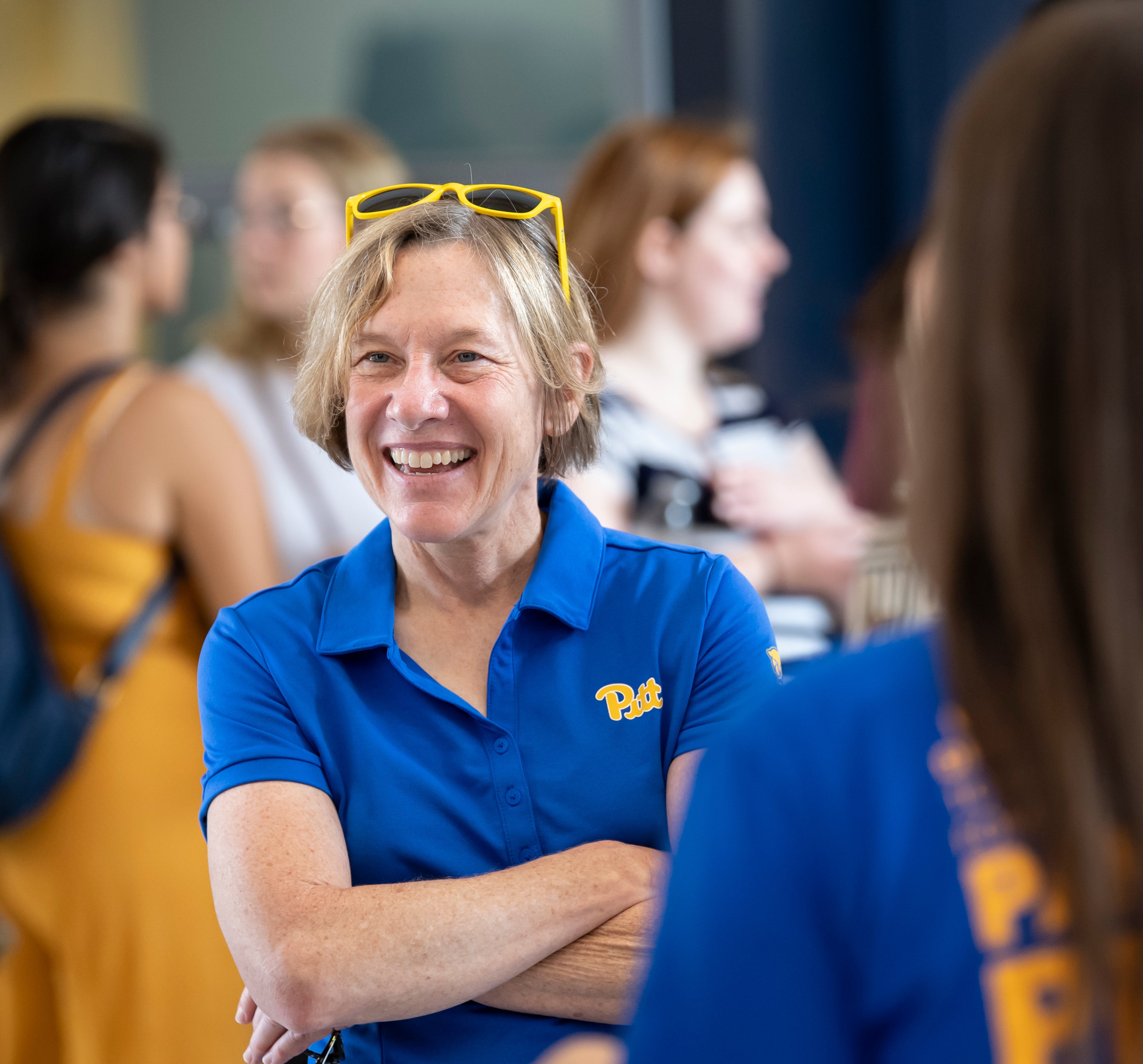 Equipped with three degrees from Pitt—a doctorate in philosophy, a master’s degree in philosophy, and a master’s degree in economics—Cudd set out to find a place in the work of shaping minds and society. Her path led to the University of Kansas in Lawrence, where she began as an assistant professor of philosophy. During her more than 25 years there, she says she learned vital perspectives on leadership and creating student access to higher education. She was highly engaged in women’s studies, which she helped to build from a minor, with a single instructor, into a doctorate program. As the program grew, her decisions were often guided by what might have helped the two women at the washing tub.
Equipped with three degrees from Pitt—a doctorate in philosophy, a master’s degree in philosophy, and a master’s degree in economics—Cudd set out to find a place in the work of shaping minds and society. Her path led to the University of Kansas in Lawrence, where she began as an assistant professor of philosophy. During her more than 25 years there, she says she learned vital perspectives on leadership and creating student access to higher education. She was highly engaged in women’s studies, which she helped to build from a minor, with a single instructor, into a doctorate program. As the program grew, her decisions were often guided by what might have helped the two women at the washing tub.
“There’s this whole basic way of looking at the world from the perspective of the oppressed,” she says. “You start there, and it’s going to bloom into a garden full of interesting issues and alliances.”
The work and the ideas Cudd found in women’s studies inspired what would come next. She became a director of Kansas’s graduate studies in 1995, then a director of the Women, Gender, and Sexuality Program in 2001. Becoming an administrator meant that Cudd could effect positive change on an ever-larger scale. She sprinted toward higher-level leadership, eventually becoming Kansas’s vice provost and dean of undergraduate studies in 2013. While in those roles, she came to care deeply about the process of student success and the broader issues of preparing campuses and students to be nationally and internationally competitive.
The United States will face a shortage of 16 million graduates by 2025, according to the Lumina Foundation, an organization focused on opening opportunities to higher education. Even more troubling, the U.S. Department of Education reports that students from high-income families are shown to be about five times more likely to get a college degree than low-income students. For a philosopher who studied systems of oppression, Cudd wondered: Are universities doing what is needed to find a way for students of all means to succeed?
Part of her race became making educational systems more egalitarian: “Certainly, as a philosopher of inequality and oppression, and also in my role as vice provost at Kansas, I was concerned about how I can impact this. I see my career as an opportunity to have an effect on inequality in America and on higher education at a broader scale.”
At about the same time, Kansas entered a pioneering initiative called the University Innovation Alliance, a cohort of 11 public research colleges sharing strategies for recruiting, retaining, and graduating low-income students and students of color. Cudd helped establish the program at Kansas, and the Alliance has gone on to produce nearly 30 percent more graduates who come from low-income families.
Bernadette Gray-Little, then-chancellor of Kansas, well remembers Cudd’s foundational work: “She was important [to the Alliance’s] early development, helping to focus our retention and graduation and change this cycle of inequality.”
Cudd left Kansas in 2015 to become dean of the College and Graduate School of Arts and Sciences at Boston University, where she planned to continue implementing the kind of change that would make the teenage version of herself, striving for equal opportunity, proud. It was also the kind of change that made her alma mater proud.
After a national search for its provost in 2018, the University of Pittsburgh selected Cudd to succeed Patricia Beeson—who happened to have been a grader for Cudd’s graduate economics exam. Beeson was returning to the faculty following eight years of service as provost.
It’s no surprise that as soon as Cudd arrived at Pitt, she hit the ground running. Literally. She’s out early many mornings, jogging about six miles, tracking through the same streets where she prepared to run one of her first marathons as a graduate student. She says she uses the time to clear her head before she gets to campus by 8 a.m.
In her office, the energy doesn’t wane.
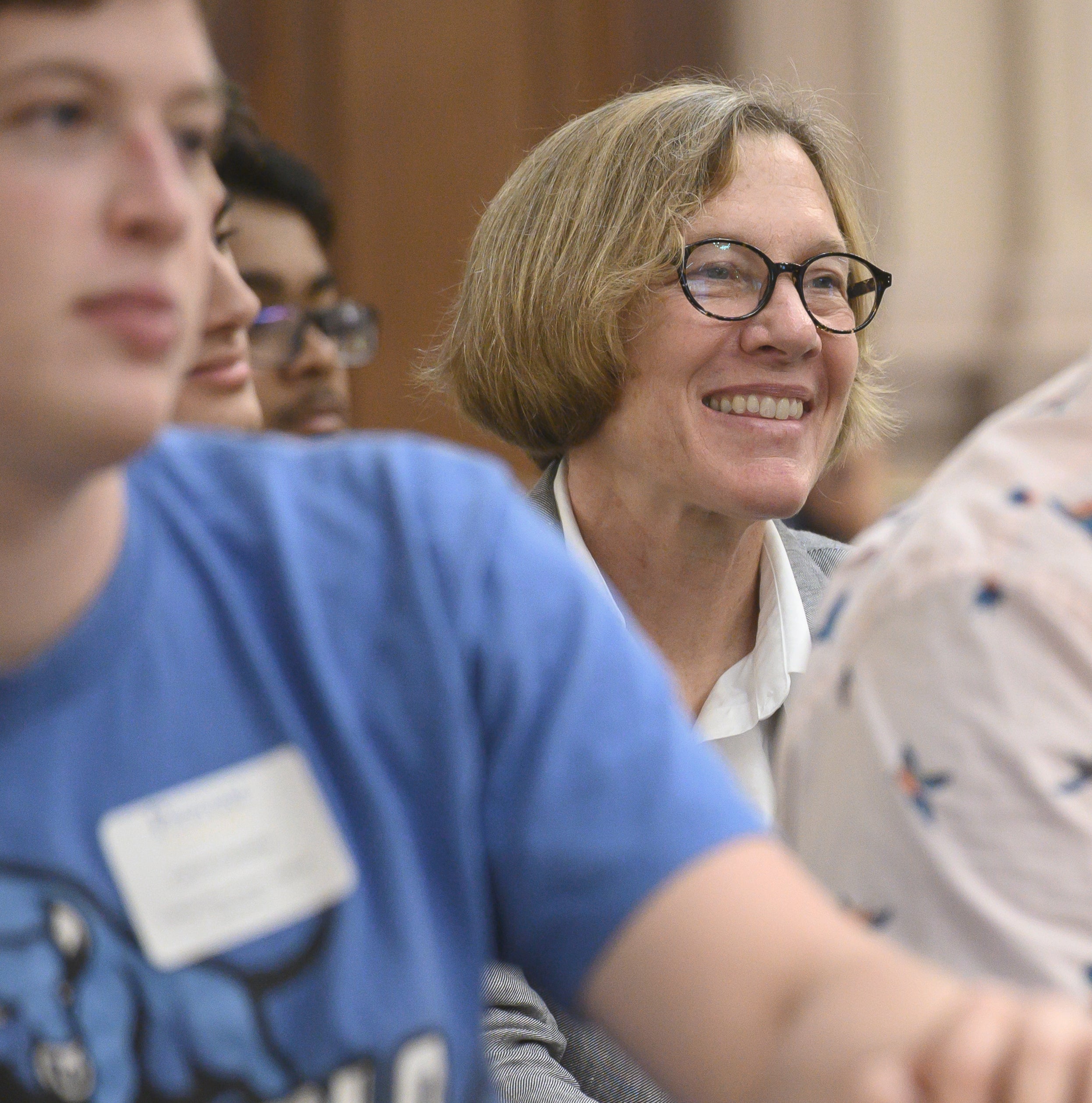 Already, she’s advanced initiatives to empower students to apply their skills toward success, including work to strengthen the Interprofessional Center for Health Careers to support student interest in health science fields.
Already, she’s advanced initiatives to empower students to apply their skills toward success, including work to strengthen the Interprofessional Center for Health Careers to support student interest in health science fields.
She’s overseen the Year of Pitt Global, which showcased how the University is integrating broad, global perspectives into learning, research, and innovation, and mobilized new efforts to do the same. She’s also launched the current Year of Creativity, with its goal of uniting Pitt’s intellectual and artistic endeavors to light the spark of knowledge-building across the University.
Throughout it all, exchanges of ideas remain a vital component of her work. Her office doors are often ajar—she hosts open hours for monthly conversations with professors, students, and staff on how to make campus life better. She also writes monthly emails to the campus community—lauding award-winning faculty, commenting on initiative-building, and sharing thoughts on equity and justice.
And, of course, six months after arriving on campus, she crafted and launched what she says she’s most proud of to date—Pitt Success—which, through financial aid and mentoring, will improve the numbers of diverse and low-income students.
“We’re helping to change the growing engine of inequality into an engine of greater social mobility,” Cudd says.
With so much going on, each day holds something new for Pitt’s provost. She’s just supporting scholarly excellence among more than 4,600 full-time faculty and success for more than 34,000 undergraduate, graduate, and professional students on five campuses. Her overall responsibilities encompass all of the academic schools, as well as oversight of the University Library System, Student Affairs, Admissions and Financial Aid, and the Registrar.
Good thing Cudd has so much experience being on the run.
On the day of what had become a painful marathon, she crests a hill on Forbes Avenue, the Cathedral of Learning in her sights. A pack of Pitt friends sees her and cheers her on. Cudd, painful knee and all, is driven on by a will to succeed. And, with a time of 4:50:08, she completes the race.
It’s far from her best performance; but it has never been only about speed. It has been about never losing sight of what’s ahead.
Cover image: On the Cathedral walkway with Pitt Pathfinder students, from left to right, Julie Kenneson, Chase Diehl, and Lindsay Hopewell
This article appeared in the Winter 2020 edition of Pitt Magazine.

